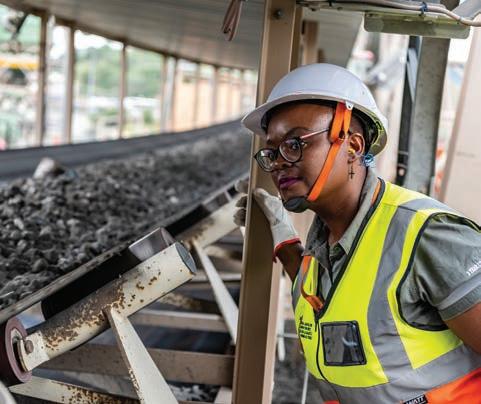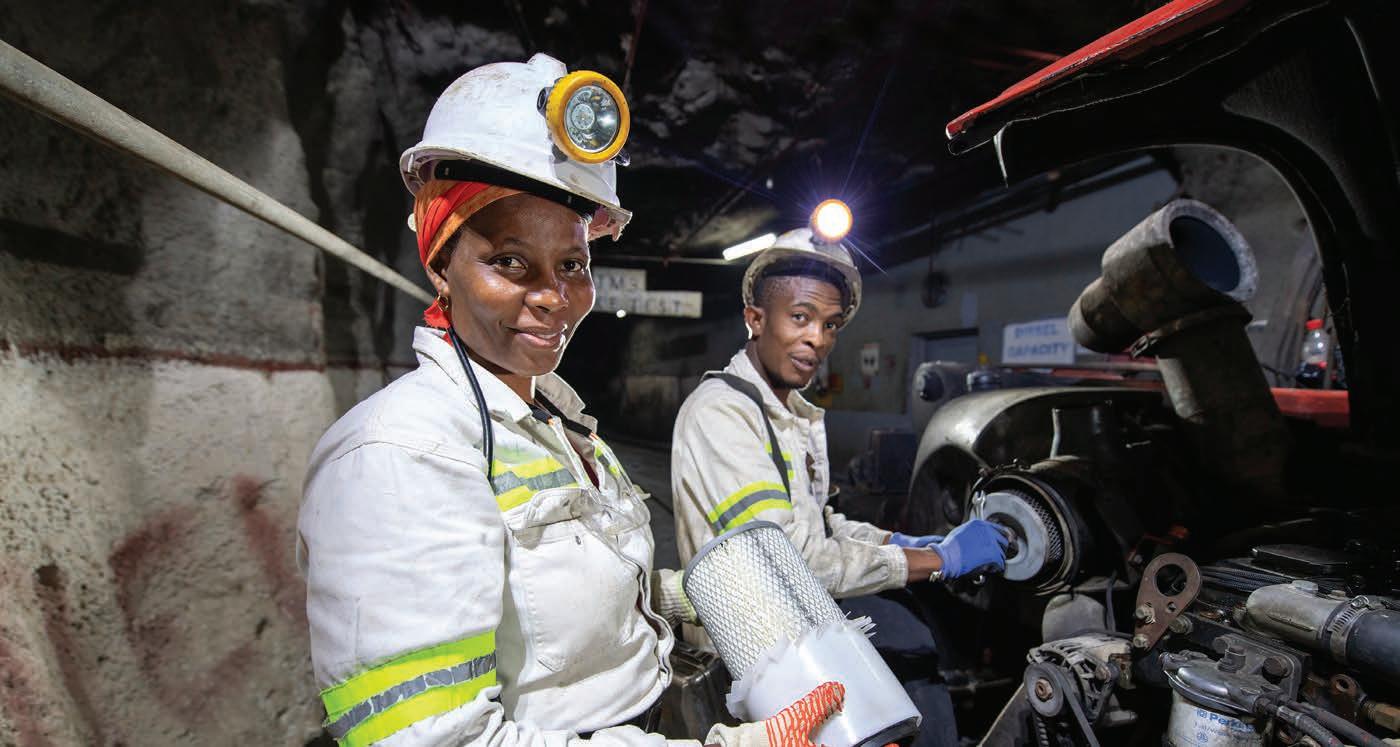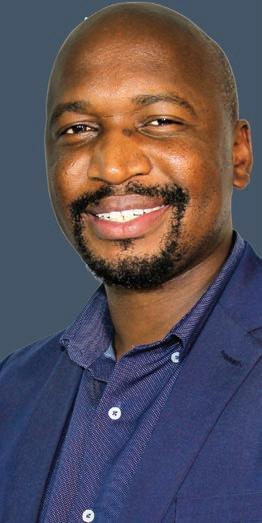
15 minute read
Can the sector regain its lustre?
Anglo American Platinum, Modikwa
IS RECOVERY ON THE CARDS?
Roger Baxter, CEO of the Minerals Council South Africa, shares his views on whether the mining sector will recover after years of steady decline. By Ryland Fisher
The man at the helm of the Minerals Council South Africa, CEO Roger Baxter, feels that the sector can regain its lustre and play a significant role in reviving our economy.
“South Africa still has significant mineral potential, which can be unlocked with the right policies and an enabling environment. In our view, mining can get back to above 10 per cent of GDP and lead the economic revival of the economy,” says Baxter.
“To do so requires an unlocking of investment in the sector (which, in turn, requires a more competitive investment environment). Mining can grow employment, GDP, exports, taxes and transformation, with the right enabling framework. There is progress being made. The current health crisis has acted as a catalyst for all of us to realise that by working together we can change the environment in a positive way.”
FAST FACT Mining went from contributing 14,7 per cent of gross domestic product (GDP) in 1994 to about 8 per cent in 2019. MINING’S PROBLEMS LINKED TO ECONOMIC WOES
Baxter links the problems in the mining industry to South Africa’s own economic woes combined with lost opportunities, mainly due to bad policy and expenditure decisions by government.
“South Africa’s economy decoupled from other emerging economies, from a growth rate perspective back in 2009 after the global financial crisis. In the past decade, South Africa grew a paltry 1.5 per cent per annum versus 4 per cent for other developing countries. In that same period, South Africa’s government lived totally beyond its means with gross public debt rising from 24 per cent of GDP in 2008 to 81 per cent now.
“South Africa has lost ground down the global competitiveness ranking falling to 60th in the World Economic Forum rankings and 84th in the World Bank Ease of Doing business rankings. Even before the pandemic, the South African economy was in an economic crisis with a record number of people unemployed, and rising poverty and inequality, among others.
“Over the past 10 years, the South African mining sector went sideways, missing out on the 2011/12 boom. In 2019, South Africa
Northern Platinum, Booysendal

accounted for a paltry 1 per cent of global exploration expenditure and only 0.1 per cent of global greenfields exploration. With limited exploration activity, the new projects pipeline has been weak; very few large-scale new mines have been developed (most have been brownfields expansion of existing ops),” says Baxter.
Some of the challenges faced by the mining sector over this period, says Baxter, include a more than 500 per cent increase in the electricity price (which has had a huge cost impact on electricity-intensive mines and smelters), load shedding (the sector lost three per cent of production in 2019 due to load shedding), and “regulatory uncertainty created by former minister Mosebenzi Zwane when he published a damaging charter in 2017. The result has been wasted potential in mining”.
The mining bosses, represented by the Chamber of Mines and then the Minerals Council, have consistently opposed this Mining Charter. However, since then, there has been greater co-operation and understanding between government and business, including the mining industry.

Implats, Impala 11C Shaft
WORKING MORE CLOSELY WITH GOVERNMENT
Baxter says that the mining industry has been working closely with government over the past few months and most of its suggestions have been included in the Reconstruction and Recovery Plan announced by President Cyril Ramaphosa recently.
In his announcement, Ramaphosa said it was “imperative that South Africa restored investment and exploration levels in the mining sector as mining and mineral beneficiation activities have significant potential to drive long-term growth, exports and job growth”.
Baxter feels that one of our biggest achievements is government’s acknowledgement that it needs to reduce red tape for the industry, which could potentially open up new opportunities.
“The Department of Mineral Resources and Energy has committed publicly to develop a new exploration strategy within three months; there is a commitment to halve licensing times for prospecting and mining rights; and there is a commitment to enabling greater investment in electricity for self-generation for the mines,” says Baxter.
While he is generally happy with the recovery plan announced by the president, Baxter feels that it “does not focus on the critical issue of becoming a greater competitive country (we need to improve up the competitiveness rankings), because investment (local and foreign) will only happen if we are far more competitive.
“To improve our competitiveness we need a much more aggressive programme of structural and institutional reforms that unlock far greater private sector investment and competition in key areas – electricity, rail, ports, which are all areas currently constraining economic growth,” he explains.
“The President’s 7-a-side leadership team agrees that there will be a more detailed conversation on the critical structural reforms shortly.”
Baxter believes that “without the critical structural and institutional reforms and improving global competitiveness, South Africa will not be able to attract the necessary investment to grow its way out of this crisis.
“Our view is that the current plan, while a step in the right direction, does not focus enough on the real reforms that will unlock the economy. It appears to be more of a stabilisation plan. Even with fiscal consolidation, in the absence of much higher investment and growth, South Africa will remain in an ongoing fiscal crisis. To reiterate – it is now critical to focus on the structural and institutional reforms that will drive competitiveness, lift investment and enable much higher inclusive growth,” he concludes.
MINING’S RESPONSE TO THE CURRENT HEALTH CRISIS
Minerals Council South Africa CEO Roger Baxter believes that the mining sector handled the COVID-19 pandemic well and quickly implemented a set of standard operating procedures (SOPs) with preventative and mitigating measures. “Our aim was to save lives and save livelihood.
“Over the past two months, the Department of Mineral Resources and Energy and Minerals Council have engaged extensively on a range of measures to revive mining in this new period (we are not calling it a post-pandemic period – because coronavirus remains a material challenge).”
Six areas are being focused on, including: • creating a broader social economic leadership compact that includes communities • developing a new exploration strategy for the country • improving policy and regulatory certainty and reducing red tape • driving investment and growth in network industries (especially electricity and rail) • promoting greater localisation and beneficiation • promoting investment in mining and exploration.




Delivering Real Value Through True Transformation
For us transformation means taking intentional actions to address previous inequalities and providing opportunities for sustainable and inclusive economic growth.






Transformation is about enabling our country to realise its full potential across employment equity, diversity and inclusion. Our company views transformation as broader than just complying with the B-bBEE Act, EE Act and the Amended ICT Sector Codes. Nearly all of our representation metrics exceed the benchmarks – but we know we could always do better. We have focussed plans in place to ensure that all of our B-bBEE pillars - specifi cally Employment Equity, Skills Development, Enterprise, Supplier and Socio-Economic Development are just that – pillars that underpin the way we think about doing business and how we empower our people.
For us sustainable transformation is about making a positive long-term impact on our key stakeholders – our employees, clients, shareholders, partners, the governments, and the communities in which we operate.
Our purpose is to give people the power to do more and, given that intention, we have made a commitment to our communities to support what we call the creators of tomorrow in building their aspirations to become more. At Dimension Data enabling our country to realise its full potential through diversity and inclusion, is key to delivering on making tangible change. As we make changes with one person at a time, we are aware that the knock-on eff ects of the individual changes have a far-reaching impact as they reach
entire communities. ›









In 2019, Dimension Data’s Saturday School Programme won Best Corporate Social Responsibility (CSR) Practice: Social Contribution’ award at the NTT CSR conference in Tokyo.








We employ over 10 000 people who make a diff erence in the lives of the societies within which they operate.



B-bBEE Drivers
Dimension Data has off ered two successful B-bBEE schemes, with a third currently a year into its life cycle. The fi rst scheme came into eff ect in 2004 and vested in 2012, benefi tting thousands of employees and broad-based groups and transferring a total of R1.26-billion to its benefi ciaries. This was immediately followed by an ESOP scheme, which was concluded in 2017 and has been unwound and its benefi ciaries were paid out at the end of August 2019.
In December 2019, we announced a 15% employee ownership scheme, giving our staff ownership in the company, without any personal investment fi nanced by the company at a discounted rate. The purpose of this off er is to further engage employees in the development of our business by allowing them to become shareholders of our company.
The units will vest in three years and they will be paid out in seven years’ time. That transaction, together with the sale of The Campus precinct, lifted the company’s black ownership recognition to 51%.
Education and Personal Development
A key pillar in contributing to social progress is the investment in education at every stage of the learner’s journey. Over 2million learners walk more than 10 km to get to school every day. To support a better transition into the classroom we’ve partnered with Qhubeka to provide bicycles to those in need.
Because we believe technology off ers a better future in education, we’ve incorporated coding and robotics as part of our Saturday School Programme. For the past 25 years and into the future we’re committed to invest in the futures of children from disadvantaged backgrounds to achieve excellent results in matric, many of whom will acquir great careers here and abroad.

The key to achieving this remarkable potential which we all know is inherent in South Africa, is the development of a sustainable transformation environment. Dimension Data is an action orientated brand and we can demonstrate our commitment through our partnership with Global Computing and Telecoms that began in 2016.
At that time MD Sello Mbuli, joined our enterprise and supplier development programme to deliver sustainable business development for his company. Mbuli says that the training which entailed business skills, fi nance and self-mastery, allowed him to endure the sustained pressure of running a business with all it’s day to day challenges. The programme also provides offi ce space that enabled Mbuli to scale up, and nationally he now has offi ces in Limpopo, without the additional costs of establishing a regional offi ce. In 2020, Mbuli was recognised as the Microsoft Managing Director of the Year, an accolade that makes us proud to have been a part of this remarkable business’ success.
We recently celebrated 25 years of our Saturday School Programme, which has helped 100% of its learners from disadvantaged backgrounds pass matric – with 93% of them gaining university exemption in 2019.
At the Dimension Data Saturday School Programme, we off er learners a safe, distraction free environment where they show up and focus on STEM education, starting with the foundations and building iteratively from there.
In addition to the grassroots impact programme, we also run two graduate programmes: • The Graduate Accelerate
Programme (GAP) off ers new graduates the chance to build their personal network inside the company, deliberately exposing them to functions across the business, giving them the runway to work on a variety of projects to help them discover where they fi t the best. • The Technical Accelerate
Programme (TAP) develops future technical leaders and subject matter experts, exposing graduates to technical related training in partnership with UiPath Academy and global technical resources.


Sello Mbuli, MD, Global Computing and Telecoms
Beyond the graduate programmes, we continue to invest in our staff , and off er a Fast Track Management Programme aimed at developing black staff members across the business.
In 2019 we invested over R100-million in learning and development, 18% of which was spent specifi cally on advancing black women, who have historically been left out of the mainstream economy. We also pay particular attention to people living with disabilities, the youth and the unemployed.
Building an Inclusive Economy
We are committed to supporting existing female and black-owned small, medium, and micro enterprises to drive transformation in the SME’s sector. We are furthering our transformation journey and pursuing a sustainable South Africa. We believe that transformation is crucial in providing equal opportunities for employment in an inclusive environment.
Recognising the critical role that SME’s play in the sustainable development of the country, we started the Business Accelerator Programme (BAP) in 2009, a 10-month programme specifi cally designed to develop emerging black businesses and provide entrepreneurs with tools to help grow their businesses.
BAP is rooted in our own business strategy, with the aim of integrating SMMEs into our core business operations. Supported by a proactive procurement policy, the value of procurement under the programme has grown to over R100-million in just three years.
Addressing common business challenges, the BAP takes entrepreneurs from across the country through a ten-month programme to improve their business and management skills. The
100% Saturday School Programme pass rate achieved every year and over 2000 young people have benefi tted.

programme draws from our principal areas of operations, namely Gauteng, Western Cape, and KwaZulu Natal and reaches, on average, 60 companies a year. We understand that every company is diff erent and the assistance we provide is tailored to the specifi c needs of each company.
Our Supplier Development Programme is rooted in our own business strategy and aims to integrate SMEs into our core business operations. Supported by a proactive procurement policy, the value of procurement under the programme has grown to over R100-million in just three years. We would never have been successful 37 years ago if others hadn’t given us a chance and we’re committed to help today’s small businesses succeed and do more.
Management Control and Employment Equity
As of FY20, Dimension Data’s board comprises of six directors. Three of the directors are African individuals, two of whom are women.
While we are an equal opportunity employer and continue to off er opportunities for development and advancement to all our employees, we recognise that focus must be given to improving inclusivity in terms of race, gender and people living with disabilities. To this end, we have consistently seen a steady improvement in the diversity of our staff profi le at all levels. In recognition of the need to further accelerate diversity, particularly at senior levels, the Dimension Data board and executive team have approved specifi c measures to attract, engage, develop and retain black staff , as well as people living with disabilities.
We are committed to creating a transformed, inclusive and diverse workforce, which provides equal opportunities for all our people, whilst giving special consideration to employees from designated groups. We aim to remain a Top Employer; to continually consider, develop and empower black people and women for top management positions within Dimension Data.
Transformation never stops, but we’re proud of where we’ve invested our resources and the impact these eff orts continue to make. We believe our role as a business in South Africa is not only to build the economy, but to build a better South Africa.










